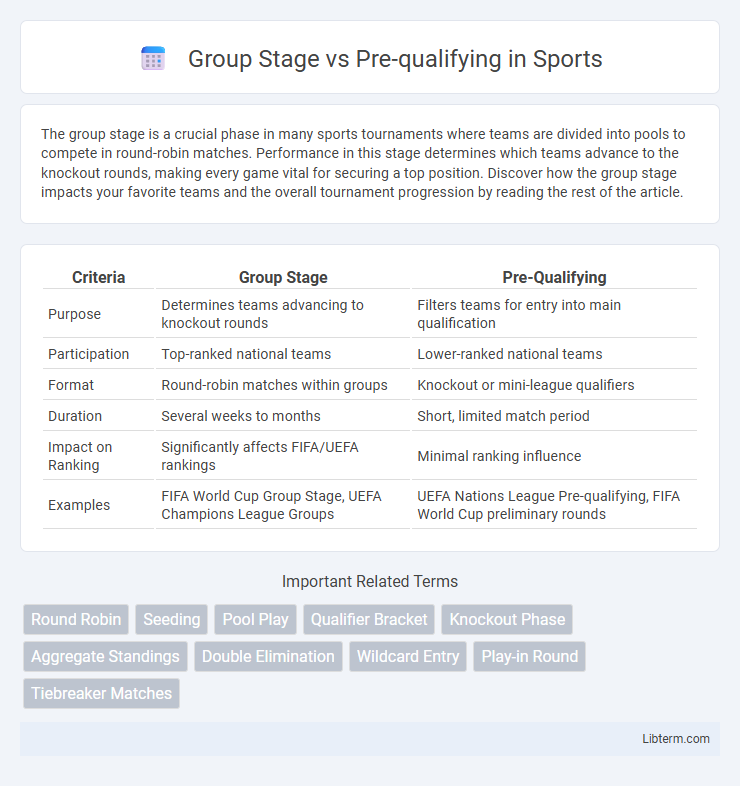The group stage is a crucial phase in many sports tournaments where teams are divided into pools to compete in round-robin matches. Performance in this stage determines which teams advance to the knockout rounds, making every game vital for securing a top position. Discover how the group stage impacts your favorite teams and the overall tournament progression by reading the rest of the article.
Table of Comparison
| Criteria | Group Stage | Pre-Qualifying |
|---|---|---|
| Purpose | Determines teams advancing to knockout rounds | Filters teams for entry into main qualification |
| Participation | Top-ranked national teams | Lower-ranked national teams |
| Format | Round-robin matches within groups | Knockout or mini-league qualifiers |
| Duration | Several weeks to months | Short, limited match period |
| Impact on Ranking | Significantly affects FIFA/UEFA rankings | Minimal ranking influence |
| Examples | FIFA World Cup Group Stage, UEFA Champions League Groups | UEFA Nations League Pre-qualifying, FIFA World Cup preliminary rounds |
Understanding Group Stage and Pre-qualifying
The Group Stage is a structured phase in tournaments where teams compete within sets of groups to qualify for the knockout rounds based on accumulated points. Pre-qualifying is an initial elimination round designed to filter lower-ranked teams before they enter the main Group Stage. Understanding both phases clarifies the tournament progression, highlighting how Pre-qualifying narrows the field while the Group Stage determines the strongest contenders through round-robin matches.
Key Differences: Group Stage vs Pre-qualifying
The Group Stage features top teams competing in a round-robin format to secure advancement, while Pre-qualifying involves lower-ranked teams battling for entry into the main competition. Group Stage matches carry higher stakes and greater visibility, impacting official rankings and tournament seeding. Pre-qualifying rounds serve as preliminary filters, often determining eligibility and shaping the final lineup of contestants for the Group Stage.
Structure and Format Comparison
Group Stage features multiple teams divided into pools, each competing in a round-robin format to determine advancement. Pre-qualifying involves knockout or mini-tournament structures designed to filter teams before reaching the main qualification rounds. The Group Stage emphasizes balanced competition and consistent performance evaluation, while Pre-qualifying focuses on rapid elimination and initial team sorting.
Impact on Team Performance
Group Stage matches provide teams with multiple opportunities to compete, allowing for strategic adjustments and improved cohesion that often enhance overall performance. In contrast, Pre-qualifying rounds demand immediate high-level execution under pressure, which can strain less experienced teams and negatively affect confidence. The differing formats significantly influence team dynamics, with Group Stage fostering development while Pre-qualifying tests resilience and readiness from the outset.
Qualification Criteria Explained
Group Stage qualification requires teams to finish among the top spots in their initial pools based on points accumulated during round-robin matches, emphasizing consistent performance against multiple opponents. Pre-qualifying involves meeting specific criteria such as regional rankings, previous tournament outcomes, or national federation selections to advance into the main qualification rounds. Understanding the difference in qualification criteria highlights the structured progression where pre-qualifying filters entrants for the Group Stage, ensuring only the strongest teams compete for ultimate tournament placement.
Viewer Engagement and Excitement
Group Stage matches generate higher viewer engagement due to the presence of top-ranked teams and well-known players, which boosts excitement and fan investment. Pre-qualifying rounds often feature emerging teams with less established fanbases, resulting in lower initial viewer interest but providing opportunities for underdog stories that can captivate audiences. The intensity and stakes in the Group Stage create a more compelling viewing experience, driving higher ratings and social media interactions.
Historical Examples of Both Stages
Historical examples of group stages include the FIFA World Cup, where teams compete in round-robin matches to qualify for knockout rounds, demonstrating consistent performance over multiple games. Pre-qualifying rounds, seen in the UEFA Champions League, filter lower-ranked teams through knockout ties before the main group stage, emphasizing immediate elimination. These stages highlight different competitive structures: group stages reward sustained skill, while pre-qualifying focuses on high-stakes survival.
Pros and Cons: Group Stage vs Pre-qualifying
The Group Stage offers teams consistent competition against multiple opponents, providing ample opportunities to gain points and improve rankings, but increases the risk of fatigue and higher operational costs. Pre-qualifying stages allow lower-ranked teams to compete for entry, fostering broader participation while potentially limiting exposure and experience due to fewer matches. While the Group Stage emphasizes sustained performance and fan engagement, Pre-qualifying acts as a filter yet may create disparities in competitive readiness.
Effects on Tournament Scheduling
Group Stage matches create a fixed schedule with predetermined fixtures, allowing organizers to plan venues and broadcast slots efficiently. Pre-qualifying rounds introduce variability in tournament timelines due to unpredictable outcomes and the need for additional matches, often causing scheduling conflicts and compressed rest periods for teams. The inclusion of pre-qualifying stages requires flexible contingency planning to accommodate potential delays and ensure smooth progression into the main tournament phases.
Future Trends in Qualification Formats
Future trends in qualification formats emphasize integrating dynamic group stages with streamlined pre-qualifying rounds to enhance competitive balance and viewer engagement. Data-driven algorithms and AI are increasingly applied to seed teams fairly, minimizing disparities and ensuring high-stakes matches in both phases. Emerging models also explore hybrid qualification systems that combine round-robin group play and knockout-style pre-qualifiers to optimize scheduling and audience retention.
Group Stage Infographic

 libterm.com
libterm.com